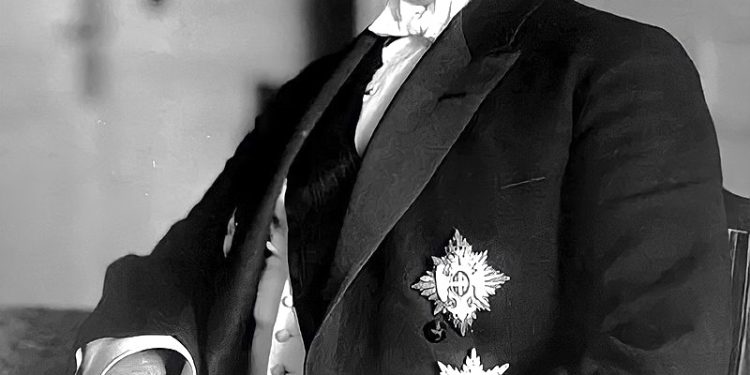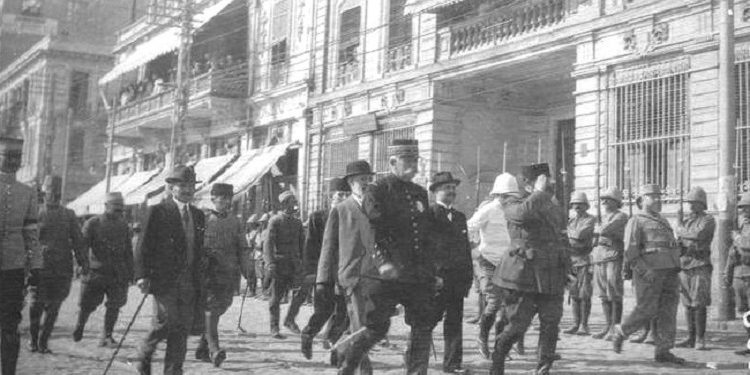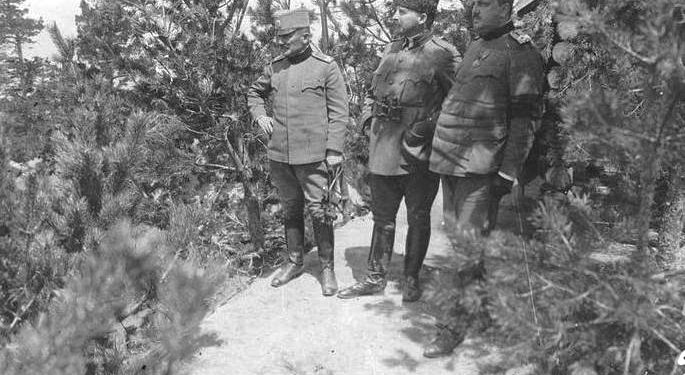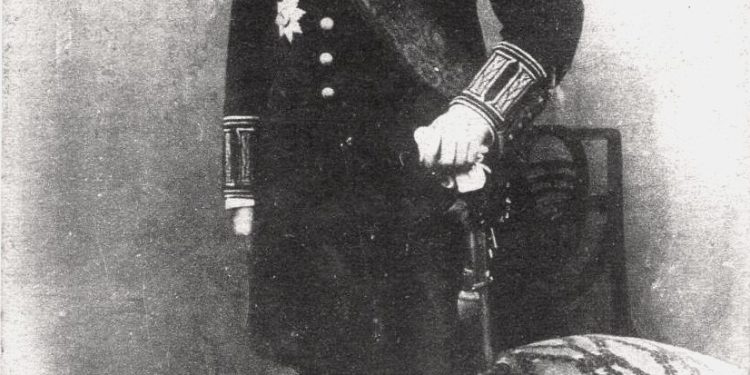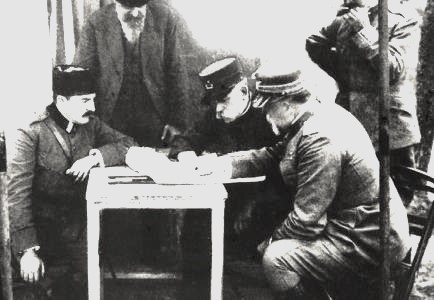Part Two
-Albanian-Serbian Relations, in the light of the latest archival documents from Serbia –
Memorie.al / For the first time, one of the most talked about and stigmatized Albanian political figures by 20th-century historiography and politics, Esat Pasha Toptani, has now been “declassified” by official Serbian historiography, in Volume II by authors Ljubodrag Dimić and Gjorgje Borozan (academic historians), titled; “The Yugoslav State and the Albanians,” offered exclusively by the “Military-Historical Institute” of Yugoslavia, published in September 1999.
Continued from the previous issue
HOW DID ESAT PASHA COMPLAIN TO THE PRIME MINISTER OF SERBIA, PAŠIĆ?
Paris, January 20, 1920
(Private)
My dear Chairman!
I stood by the Entente: on behalf of Albania, I declared war on Austria, using all the means that local and international law allowed me as the representative of my country in the post of head of government and the highest state authority, on behalf of my Muslim-majority people, also responding to the worldwide call to enter the war, which Turkey made.
Many misfortunes befell me, but I managed to finish this path I had started. Turkey at that time decided to take the final step. It sent me to Italy (which had not yet entered the war), on a secret military mission, under the leadership of Fuad Pasha, who deeply believed in my honor, loyalty, and patriotic feelings. But when I refused his proposals, he held me as a prisoner in the Court…! Afterwards, the Military Court in Istanbul sentenced me to death and the confiscation of all my assets.
There is no need to speak of my role and contributions in favor of the Serbian army and the defense of Durrës, in cooperation with the Italian troops. As a reward…, I was decorated with the Grand Cordon of “Saint Maurice and Lazarus.”
When my stay in Durrës became impossible, I abandoned it, believing the word of the special Italian diplomatic representative, who communicated to me in full confidence that; Italy, from the Entente Powers, had been tasked with militarily securing my personal withdrawal, and that of my government and army, under the same conditions with which France acted with the Serbian government and army.
I went to Italy and, in fulfillment of the duty of my military withdrawal; I was installed on the island of Ponza, near Naples.
The Italian government declared to me that; “de facto,” it recognized me as the head of the Albanian government, but the talks I held with its representatives to formalize this recognition in writing were not successful.
Therefore, for this reason, I refused to fulfill the request of Mr. Salandra, who politely asked for my approval, after he informed me about the decisions of the Secret Pact of London of April 1915, on Albania, which caused me to be placed in a situation of isolation, in a corner of Italy, which was in flagrant contradiction with the reciprocal commitments that had been undertaken by me, in cooperation with the Entente Powers.
For this reason, I abandoned Rome and went to Paris. But even the talks I had there with Mr. Titoni, the current Italian ambassador in Paris, were not successful.
In the wake of these failures in Paris, the President of the French Republic expressed his gratitude for the services I had done for the allies until that time and for this, he decorated me with the Grand Order of the Legion of Honor. A few days later, in response to the invitation of the British government, I went to London and, from the hand of the King himself; I received the decorations of the High Order of “Saint Michel and Saint Georges.”
…The French government requested my cooperation and military engagement on the Eastern Front. After preliminary talks with the French government and the diplomatic representatives of the Serbian government, I gave my final consent.
In August 1916, I went to Thessaloniki accompanied by Mr. De Fonten (the French Minister Plenipotentiary to my government), by Mr. Krajevski (the representative of the French government to the Control Commission in Albania) and by Mr. Gavrilović (the plenipotentiary diplomatic representative of Serbia). Afterwards, the Kingdom of Greece also appointed its diplomatic representative to my government, and after that the Russian Empire.
My army, which at that time was on the island of Ponza in Italy, was moved to the Thessaloniki front, with the help of the French army and was then placed under the command of a French military mission. Together with me, my army fought alongside the French military mission unit, on the same front, with a length of 30 kilometers, up to the coast.
The successful cooperation of the French army with my army is mentioned in many important military reports and the press, for which the President of the French Republic sent me several warm thanks and congratulations, while General Franchet d’Espèrey, Commander-in-Chief of the allied troops on the Eastern Front, assured me that; France would never forget the services I had done for it and the victorious allies of the War.
I personally, as well as many Albanian officers and fighters, were decorated with the “War Cross” for heroic deeds. This proves in an indisputable way the perseverance and heroism of my fighters. But my services to the Entente allies, as well as in the post of head of the Albanian government, had very serious consequences for me.
Thus, two times in a row, the Austrian naval fleet, from the coast of Durrës, bombed with heavy cannons and destroyed the government buildings of my government in this city, as well as my properties, completely destroying them. In response to these attacks, my artillery caused heavy losses to the enemy fleet, sinking a torpedo boat and taking its crew as prisoners.
Later, joint enemy units attacked all my properties, stole everything, cut and stole my forests and plundered a lot at the expense of my personal assets, which I sacrificed without any hesitation. Thus, at the end of the war, all the losses in people and property, military and civilian, remained on my shoulders.
France, to my army, when we were fighting on the Thessaloniki front, only provided weapons and food. Bearing all the expenses and damages caused, today it is difficult for me to even ensure the normal functioning of my government, or to support even a part of the army, which, together with the government, remained in Thessaloniki. During the military actions, many Albanian fighters died, were wounded, and were mutilated.
Adhering to the promises to them and their families, I continue to regularly pay the pensions they are due. Afterwards, at the end of the war, the French government, in the presence of all diplomatic representatives, gave me an ultimatum not to return to Albania, or even to approach it, until the Peace Conference decides on the basis of the future status of Albania.
This behavior is based on the dissatisfaction and malevolence of a Great Allied Power, which has as a reason for this the non-fulfillment of its promises. I now feel extremely tired of continuing to live outside my country, in very difficult material conditions. The order to stay away from my country is the most surprising decision, which has closed the door of cooperation and communication with my country and compatriots…!
Under such circumstances, I ask to be promised compensation for the losses suffered, which can be valued at 10 million gold francs. It is not at all fair that, of all the victorious allies, only I suffer material and financial damages. I do not dare to even think of such a completely unjust punishment, let alone accept it.
So I ask the Allied Powers to try and make deserved decisions in favor of my country, without forgetting what I have done for the common cause, during the difficult days when I was on their side and when, with my free will, I was elected head of a government also elected with free will, which the allies unanimously recognized as such.
I also ask that all the rights that I had and that were unfairly taken and denied from me be returned. I hope that after these requests, the promises given will be kept and the categorical statements of France will be withdrawn, and that it will keep its promises, and those of its statesmen, and that the cooperation and relations with me will continue.
If the Peace Conference decides to entrust the mandate over Albania to Italy, as it turns out from the information I have secured so far, it becomes clear to me that, in the future, I will no longer have the opportunity to return to my country.
The hostility that Italy has shown and continues to show towards me, based only on some facts and trifles, because I have not accepted its orders, or because I have refused my complete political and military isolation, which interested its politics, is permanently closing the doors of my homeland.
What should I do under such difficult political and economic conditions, with consequences for me and the many followers I have in Albania? My future is becoming darker and darker, while I feel more and more grateful to the Serbian government, which has always had me in mind and has shown interest in me. /Memorie.al
Head of the Albanian government




